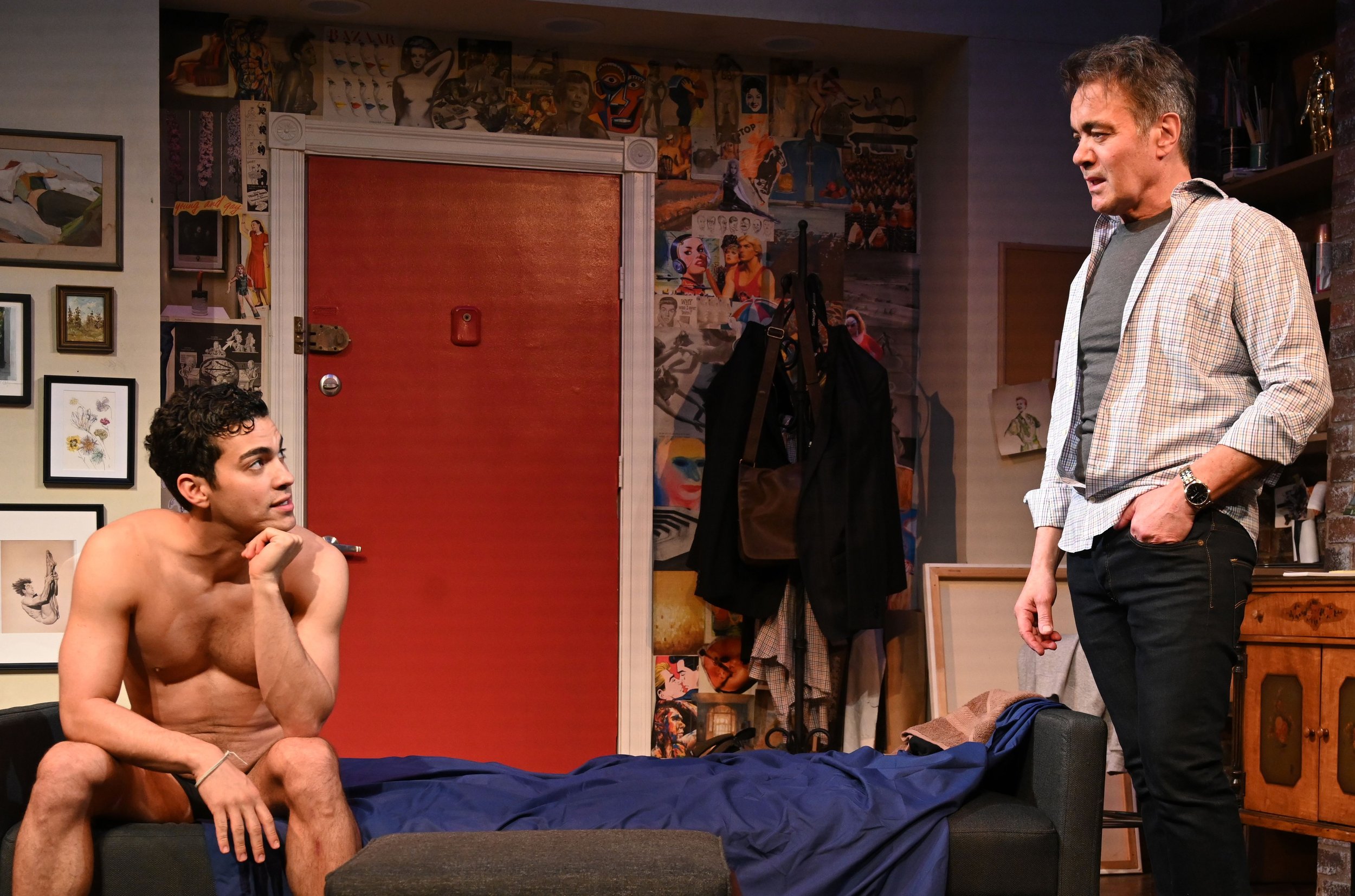Justin (Davi Santos) and Terry (Derek Smith), the morning after.
In the 1950s Paddy Chayefsky wrote a successful drama, Middle of the Night, in which nobody could understand what a young Gena Rowlands could see in an old Edward G. Robinson. Or, in the movie version, what Kim Novak could see in Fredric March. That quandary is back, after a fashion, with Mr. Parker, Michael McKeever’s sort-of-new drama (it premiered in Florida in 2018). Only this time it’s hard to see what Davi Santos sees in Derek Smith.
Santos is Justin, a 28-year-old Uber driver/bartender who gets picked up by Terry, who’s about to celebrate a glum 54th birthday. Terry’s a mess. He lost his partner of 30 years, a celebrated artist, seven months earlier, in a car accident on the West Side Highway. Since then he has been, as he explains in a lengthy opening monologue, existing but not living, drenched in guilt and loss and regret. Finally, after all those sad months, he roused himself sufficiently to go to a bar, get drunk, and pick up a hot young man (do people still do that?). But he essentially can’t get past Jeffrey’s passing, and won’t even give the go-ahead to the Whitney Museum, which wants to do a retrospective of his work. That doesn’t sit well with Jeffrey’s sister, the aptly named Cassandra (Mia Matthews), who has always handled the business end of her late brother’s artwork. She’s smart, energetic, and bossy, and she and Terry clash over just about everything.
Cassandra (Mia Matthews) admonishes Terry in a moment of disagreement.
Terry has an apartment in the Ansonia, but he doesn’t take Justin there. Instead, they go to Jeffrey’s ramshackle, skylit East Village studio, designed with apt clutter by David Goldstein. There, when Terry isn’t facing front and soliloquizing, he and Justin nurse a tentative relationship, while Cassandra drops in periodically to spar with them; this is the sort of play where people just show up unannounced and without texting first. At issue: Where do single gay men over 50 stand in society today? What are the perils of May-September romances? And will Terry ever let go of the past and move forward?
Mr. Parker is well-structured, literate, economical (it clocks in at about 85 minutes), and intermittently touching. It has an important drawback: We’re not buying it. What does Justin see in Terry, beyond the fancy duds and dinners at Blue Hill that Terry buys him? Why has Terry soured on all his friends, and why is Cassandra always so cross? And why does Justin, aside from being an expert on New York history and possessing one large secret, appear to have so little life outside of this one room?
McKeever has some potent and amusing observations about the risks of intergenerational unions, mostly about the befuddlement of fiftysomethings over technology, social trends, and the new subcategories in the LGBTQ+ universe. But he doesn’t sufficiently explain what this unlikely twosome is doing together. And all three characters have annoying character traits—Terry’s mopey, Justin’s inconsistent, Cassandra’s a scold—that make them hard to root for.
One of Terry and Justin’s less stressful moments. Photographs by John Quilty.
It’s too bad, because McKeever’s previous meditation on gay men and loss, Daniel’s Husband, managed to tap the tear ducts even while indulging in clever gay chatter and, again, delving into his favored theme of older gays dating younger ones. He’s less convincing this time out, mainly because we never quite get a handle on either of these guys. McKeever’s stage directions describe Justin as “quirky and wonderful,” but what we see is an unfocused will-o’-the-wisp with commitment issues. (His script also supplies the option of Justin “making his entrance with a towel around his waste [sic].” Santos, though, enters naked, and your phone enters a Yondr pouch.) The actors are all fine: Smith, in particular, makes a meal out of Terry’s mournfulness, questionable life choices, and struggle to join the 21st century. Santos does what he can with a character that doesn’t entirely hang together, and Matthews turns the hyper-efficient, demanding Cassandra into something human. Joe Brancato directs with snap and realism, with overlapping conversations that have the ring of truth.
In the end, Terry makes what is probably the right decision for his still-tormented soul, and he has one final monologue about coming to tentative life while observing other lives at a Starbucks. Despite Smith’s excellent work, though, the play is not as moving it should be. Mr. Parker wants to be about the difficulty of pulling a life out of the depths of tragedy. Too often, it plays more like a middle-aged gay man’s masturbatory fantasy.
Mr. Parker, a production of Penguin Rep Theatre, runs at Theatre Row Theatre 1 (410 W. 42nd St.) through June 25. Evening performances are at 7 p.m. Wednesday and Thursday and at 8 p.m. Friday and Saturday; matinees are at 3 p.m. Saturday and Sunday. Tickets are available at bfany.org/theatre-row/shows/mr-parker; special $25 rush tickets are available at the box office, cash only, 30 minutes before curtain.





